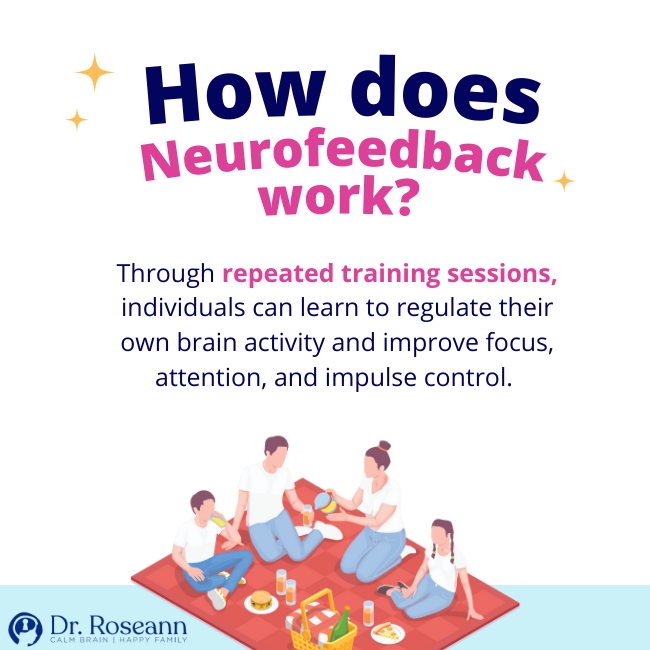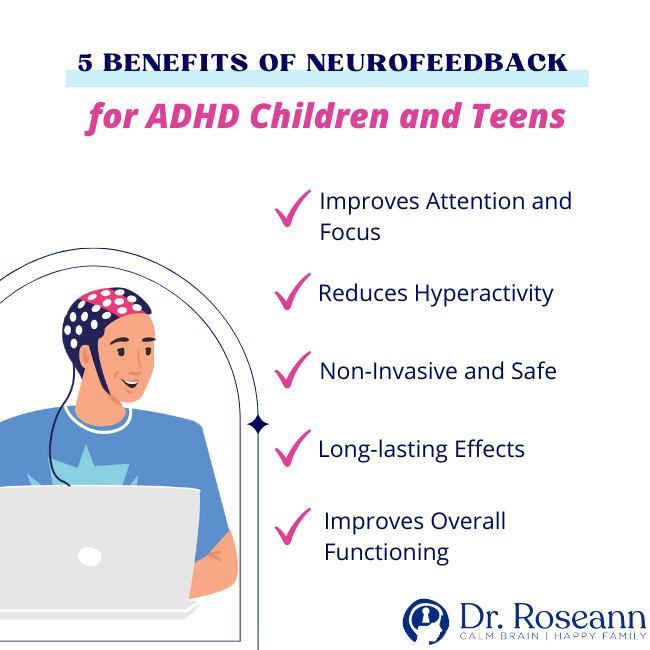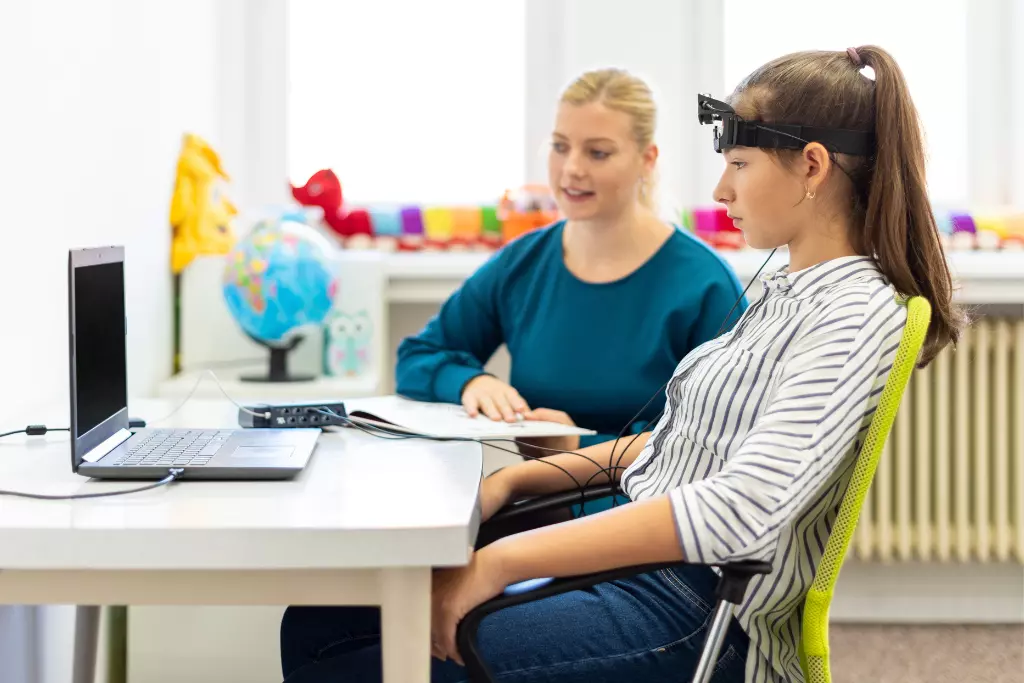Attention Deficit Hyperactivity Disorder is type of a neurodevelopmental disorder affecting children and adults. Its common symptoms are inattention, impulsiveness, and hyperactivity. These symptoms can significantly impact an ADHD kid's ability to function in daily life and can lead to difficulties in school, work, and relationships.
While medications such as stimulants and non-stimulants are often thought to be the only option in managing the symptoms of ADHD, they may not be suitable for everyone and can have unpleasant side effects. This is where neurofeedback comes in as a science-backed treatment option for those diagnosed with ADHD.
What is Neurofeedback?
Neurofeedback, also known as EEG biofeedback, is a form of therapy that uses real-time displays of brain activity to help individuals learn to control their brainwaves. It works by measuring the brain's electrical activity using sensors placed on the scalp and then providing feedback to the individual in the form of visual or auditory cues.
Through repeated training sessions, individuals can learn to regulate their own brain activity and improve focus, attention, and impulse control. The therapy is non-invasive and does not require any medication or side effects.
How Does Neurofeedback Help Children with ADHD?

One of the leading causes of ADHD is an imbalance in brain activity, particularly in the frontal lobes of the brain, which are responsible for attention, executive function, and impulse control.
In neurofeedback therapy, children with ADHD are trained to increase specific brain waves associated with attention and concentration, such as theta and beta waves. The child's brain is rewarded with positive reinforcement, such as playing a video game, a movie playing, and/or a sound when they can produce these desired brain waves.
Over time with neurofeedback training, the child learns to produce these brain waves more frequently and consistently, leading to an improvement in attention, impulse control, and overall symptoms of ADHD.
Cody was a teen with a long history of ADHD. His parents had tried nine medications for ADHD before he came to me for Neurotherapy. ADHD medication made him emotional and cranky. As a result, he struggled in school and failed most of his high school classes.
Naturally, Cody and his parents were apprehensive about trying neurofeedback, but they decided to try it out of desperation. Within a few weeks, Cody and his mom noticed that he was more alert and could read for extended periods. Then he could do his homework and schoolwork without much help.
His grades began to improve, and he was much more consistent. For the first time, Cody could use the tools he had and benefit from his IEP at school. As a result, he more than salvaged his year and walked into the 10th grade feeling confident and alert. That is the power of neurofeedback in alerting the brain.
5 Benefits of Neurofeedback for ADHD Children and Teens

#1 Improves Attention and Focus
One of the main symptoms of ADHD is inattention, making it difficult for children to focus and pay attention in school and other activities. Neurofeedback therapy can help improve concentration and focus by training the child to regulate their brain activity and produce the desired brainwaves associated with attention.
#2 Reduces Hyperactivity
Hyperactivity is another common symptom of ADHD, leading to difficulty sitting still, following instructions, and completing tasks. Neurofeedback therapy can help reduce hyperactivity by training the child to regulate brain activity and improve impulse control.
#3 Non-Invasive and Safe
Unlike medications, neurofeedback is non-invasive and does not have any side effects. This makes it a safe and effective alternative for children with ADHD who may not respond well to medications or experience unpleasant side effects.
#4 Long-lasting Effects
The effects of neurofeedback therapy can be long-lasting, with some children experiencing improvements in their symptoms for several months or even years after completing therapy. This makes it a sustainable and effective treatment option for children with ADHD.
#5 Improves Overall Functioning
By improving attention, impulse control, and reducing hyperactivity, neurofeedback therapy can lead to improvements in an ADHD child's overall functioning and quality of life. This can include better performance in school, increased self-esteem, and improved relationships with friends and family.
What Does the Research on Neurofeedback and ADHD Show?
There's been a growing body of research on neurofeedback's effectiveness in treating ADHD in children. A meta-analysis of 15 randomized controlled trials found that neurofeedback was significantly more effective than placebo and showed moderate to large effect sizes for reducing ADHD symptoms. Another study found that neurofeedback therapy was effective in reducing symptoms of inattention, hyperactivity, and impulsivity in children with ADHD.
Studies show the effectiveness of neurofeedback for the treatment of ADHD in children. For example, one study found that children with ADHD who underwent neurofeedback therapy significantly improved attention, impulse control, and overall functioning compared to a control group.
Another study found that neurofeedback therapy was effective in reducing symptoms of inattention, hyperactivity, and impulsivity in children with ADHD, with the results lasting up to six months after the treatment was completed.
A randomized controlled trial found that neurofeedback therapy was as effective as stimulant medication for treating ADHD symptoms and had fewer side effects. In addition, a long-term study found that neurofeedback therapy led to lasting improvements in attention and behavioral regulation in children with ADHD.
These studies suggest that neurofeedback therapy can be a highly effective treatment option for children with ADHD, helping to improve attention and impulse control and improving their daily functioning. In addition, Neurofeedback therapy appears to be a well-tolerated treatment with minimal side effects, making it a valuable alternative to medication for many families.
Is Neurofeedback an Option for Your Child?
Yes! Neurofeedback is a safe and effective treatment option for children with ADHD. By training children to regulate their brain activity, improve attention impulse control, and reduce hyperactivity, neurofeedback can significantly improve their symptoms and overall functioning.
It's important to note that while neurofeedback can be a valuable addition to a comprehensive treatment plan for ADHD, it is not a cure. Therefore, it is also essential to work with a qualified practitioner with experience in neurofeedback therapy for children and teens with ADHD.
Additionally, it's essential to understand that the results of neurofeedback therapy may vary from child to child and may not be immediate. However, with consistent and committed training, neurofeedback has shown to be a promising treatment option for children with ADHD.
Overall, neurofeedback therapy can provide a valuable treatment for families who are seeking a non-invasive and medication-free option for managing the symptoms of ADHD in their children. As a result, more parents and teachers are exploring this evidence-based treatment option to help children improve in school. In addition, by allowing children to regulate their brain activity and improve focus, attention, and impulse control, neurofeedback can lead to a brighter and more fulfilling future for children with ADHD.
We work with families in-person and remotely all over the world in our BrainBehaviorReset™
Program with our specialists in ADHD and executive functioning in children and teens.
Citations:
Cortese, S., Ferrin, M., Brandeis, D., Holtmann, M., Aggensteiner, P., Daley, D., Santosh, P., Simonoff, E., Stevenson, J., Stringaris, A., Sonuga-Barke, E. J., & European ADHD Guidelines Group (EAGG) (2016). Neurofeedback for Attention-Deficit/Hyperactivity Disorder: Meta-Analysis of Clinical and Neuropsychological Outcomes From Randomized Controlled Trials. Journal of the American Academy of Child and Adolescent Psychiatry, 55(6), 444–455. https://doi.org/10.1016/j.jaac.2016.03.007
Always remember… “Calm Brain, Happy Family™”
Are you looking for SOLUTIONS for your struggling child or teen?
Dr. Roseann and her team are all about solutions, so you are in the right place!
There are 3 ways to work with Dr. Roseann:
You can get her books for parents and professionals, including: It’s Gonna Be OK™: Proven Ways to Improve Your Child’s Mental Health, Teletherapy Toolkit™ and Brain Under Attack: A Resource For Parents and Caregivers of Children With PANS, PANDAS, and Autoimmune Encephalopathy.
If you are a business or organization that needs proactive guidance to support employee mental health or an organization looking for a brand representative, check out Dr. Roseann’s media page and professional speaking page to see how we can work together.
Dr. Roseann is a Children’s Mental Health Expert and Therapist who has been featured in/on hundreds of media outlets including, CBS, NBC, FOX News, PIX11 NYC, The New York Times, The Washington Post,, Business Insider, USA Today, CNET, Marth Stewart, and PARENTS. FORBES called her, “A thought leader in children’s mental health.”

She is the founder and director of The Global Institute of Children’s Mental Health and Dr. Roseann Capanna-Hodge. Dr. Roseann is a Board Certified Neurofeedback (BCN) Practitioner, a Board Member of the Northeast Region Biofeedback Society (NRBS), Certified Integrative Medicine Mental Health Provider (CMHIMP) and an Amen Clinic Certified Brain Health Coach. She is also a member of The International Lyme Disease and Associated Disease Society (ILADS), The American Psychological Association (APA), Anxiety and Depression Association of America (ADAA) National Association of School Psychologists (NASP), International OCD Foundation (IOCDF) International Society for Neurofeedback and Research (ISNR) and The Association of Applied Psychophysiology and Biofeedback (AAPB).
© Roseann-Capanna-Hodge, LLC 2023
Disclaimer: This article is not intended to give health advice and it is recommended to consult with a physician before beginning any new wellness regime. *The effectiveness of diagnosis and treatment vary by patient and condition. Dr. Roseann Capanna-Hodge, LLC does not guarantee certain results.













